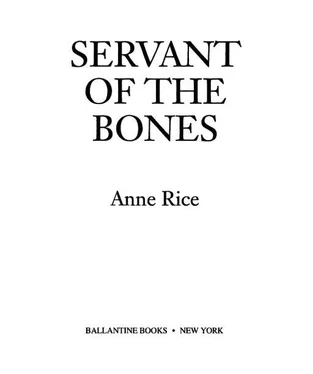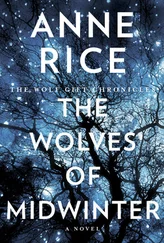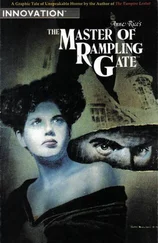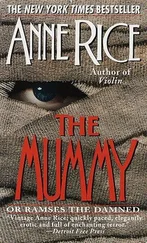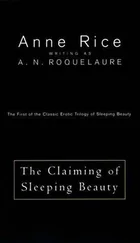Where was it now?
The memory was bitter, a fragment; I wouldn’t have it. Accusations would distract me and nothing about this past, even with Samuel, could ever, ever be changed.
I stood in this warm room in Brooklyn, with another old scholar surrounded by dusty books, spells, charms, incantations, and I hated him. I despised him. He was far more virtuous, however, than Samuel had ever been, especially in the last moments when Samuel had told me to go my way to hell.
I hated this Rebbe almost as much as his grandson hated him.
And the grandson?
What was he to me, this smooth-tongued Gregory Belkin with his worldwide church? But if he had killed Esther—
I held fast. I let the temper and the pain melt in me; I asked of myself, be alive only, and be quiet.
This young one, groomed as well as a prince, waited in patience in the same manner for the temper of the zaddik to cool.
“Why ask me these things now?” the old man demanded.
I thought of the girl, the tender girl, her head turned on the stretcher. How kind and awestruck had been her little whisper. Servant of the Bones .
The old man suddenly lost control of his anger. He gave Gregory no time to answer. He went on with his raving questions.
“What drives you, Gregory?” he asked in English. His tone was intimate suddenly, as if he really wanted to know. He rose from his chair and stood facing his grandson.
“You put a question to me,” he said. “Let me put a question to you. What is it in the wide world that you would have? You are rich beyond imagining, so rich that you make our wealth a drop in the sea, yet you make a church to deceive thousands, you fashion laws which are no laws at all. You sell books and television programs that say nothing. You would be Mohammed or Christ! And then you kill your daughter. Yes, you did it. I see into you. I know you killed her. You sent those men. Her blood was on the very same weapon which killed them. Did you do away with them as well? Was it your followers who used those assassins and then dispatched them? What is your dream, Gregory, to bring down on all of us such evil and shame that the Messiah cannot stay away a moment longer! You would take away his choice!”
I smiled. It was a beautiful speech. Remembering nothing of Zurvan then, or anyone wise or eloquent, I nevertheless warmed to this speech, and to the conviction with which it had been made. I liked the old man just a little better.
Gregory adopted the softened attitude of sadness but remained silent. Let the old man rave.
“You think I don’t know you did this?” said the Rebbe. He let himself slip back down into the chair. He had to. He was tired in his rage. “I know. I know you and have known you as no one else from the day you were born. Nathan, your own twin, doesn’t know you. Nathan prays for you, Gregory!”
“But you don’t, do you, Grandfather? You said your prayers already for me, didn’t you?”
“Yes, I said Kaddish when you left this house, and if I had only a sign from Heaven, I would bring an end to your life and your Temple of the Mind and your lies and your schemes with my own hands.”
Would you, now?
“That’s an easy claim to make, Grandfather,” said Gregory unperturbed. “Anyone can do things when he has a sign from Heaven! I teach my followers to love in a world where there are no signs from Heaven!”
“You teach your followers to give you money. You teach your followers to sell your books. You raise your voice again to me and you’ll leave my house without your answers. Your brother knows nothing of what you speak—this old childhood memory of yours. He wasn’t there. My memory of that day is very clear. There is no one alive now who knows.”
Gregory raised his hand. Peace, forbearance.
I was enthralled and tormented. I waited for the next word.
“Grandfather, only tell me then what it means, ‘the Servant of the Bones.’ Am I such filth that to answer me is to desecrate yourself?”
The old man trembled. His shoulders narrowed and drew up under his black collarless coat. He shuddered and in the light his knuckles were pink and sore to look at. The light spilled down on his white beard and on the mustache which covered his upper lip, and on the translucent lids of his eyes as he shook his head and rocked back and forth as if he were praying.
Very smoothly came the voice of Gregory.
“Grandfather, my only child is dead, and I come to you with a simple question. Why would I kill my daughter, Esther? You yourself know there is no reason under God for me to have hurt Esther. What can I give you for the answer to my question? Do you remember this story, this thing, this Servant of the Bones? Did it have a name, was its name Azriel?”
The old man was stunned.
So was I.
“I never spoke that name,” said the old man.
“No, you didn’t,” said Gregory, “but someone else did.”
“Who has told you about this thing?” the old man demanded. “Who could have done such a thing?”
Gregory was confused.
I leant my weight against the shelf of books, watching, my fingers catching the loose flaking leather of the bindings. Don’t hurt them. Not the books.
The old man sounded hard and contemptuous.
“Has someone come to you with the legend?” asked the old man. “Has someone told you a pretty tale of magic and power? Was this man Moslem? Was he a Gentile? Was he a Jew? Was he one of your New Age fanatic followers who has read your abracadabra about the Kabbalah?”
Gregory shook his head.
“Rebbe, you have it wrong,” he said with solemn sincerity. “It was only your talk of this that I heard when I was a child. Then two days ago, someone else spoke the words before witnesses: Azriel, Servant of the Bones!”
I was afraid to guess.
“Who was this?” asked the old man.
“She said it, Rebbe,” Gregory told him. “Esther said it as she was dying. The man in the ambulance heard it from her lips as she died. Esther said it, Rebbe. Esther said, ‘The Servant of the Bones.’ And the name ‘Azriel.’ Esther said it twice aloud, and two men heard her. Those men told me.”
I smiled. This was more of a mystery than I had ever imagined.
I watched them intently. My face teemed with heat. And I knew that I trembled as the old man trembled, as if my body were real.
The old man drew back. He was not willing to believe. His anger vanished. He peered into the younger man’s face.
Then came the voice of Gregory, purposefully and cleverly tender.
“Who is he, Rebbe? Who is the Servant of the Bones? What is it, this thing, that Esther spoke of? That you spoke of? When I was a child playing on the floor at your feet? Esther said this name, ‘Azriel.’ Is that the name of the Servant of the Bones?”
My pulse throbbed so loud I could hear it with my own ears. I felt the fingers of my left hand bear down slightly on the tops of the books. I felt the shelf against my chest. I felt the cement floor under my shoes, and I didn’t dare to look away from either of them.
My god, I thought, make the old man tell, make him tell so I will know, my god, if you are still there, make him tell Who and What is the Servant of the Bones? Make him tell me!
The old man was too stunned to reply.
“The police have this information,” said Gregory. “They guard it jealously. They think she spoke of her killer.”
I almost cried aloud in denial.
The old man scowled, and his eyes moistened.
“Rebbe, don’t you understand? They want to find who killed her—not that trash with the ice picks who stole her necklace, but those who put them up to it, those who knew the value of the jewels!”
Once again, the necklace. I saw no necklace then and I saw none in my memory now. There had been no necklace around her throat. They had taken nothing from her. What was this diversion of the necklace?
Читать дальше
